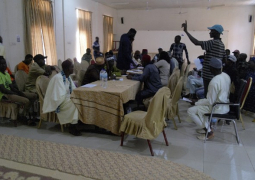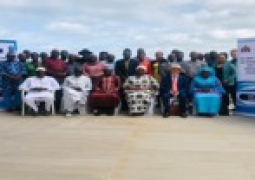In an exclusive, Alasan Gent Ceesay, a global youth leader and renowned entrepreneur, who is the chair of this year’s conference, confirmed that the music legend will be speaking at the conference.
“Salif has been confirmed as a speaker for the forthcoming conference. His appearance will take the form of a fireside chat, primarily focused on discussing his life journey from his royal lineage as a direct descendant of Sundiata Keita to his exceptional experiences and accomplishments as a musician spanning over five decades,” Mr Ceesay said.
With a very tough life in his early years and in the beginning of his career as a musician, with challenges and obstacles from almost all directions, Salif’s life story could serve as an inspiration for many.
Although Salif Keita was born into the Keita royal family as a traditional prince in his home village of Djoliba, Mali, on the 25th of August 1949, he was rejected by family and relatives and shunned by his society and community for being an albino.
This rejection even worsened when, at a very tender age, he opted to seek a career in music, which was amongst the occupational prohibitions of his noble status and, equally, which others view as un-Islamic. In 1967, he left Djoliba for Bamako, where he joined the government-sponsored Super Rail Band de Bamako. However, in 1973, Keita joined the group Les Ambassadeurs (du Motel de Bamako).
Keita and Les Ambassadeurs band-mates fled political unrest in Mali during the mid-1970s, settling in Abidjan, Ivory Coast, where they struggled financially and often had to rent equipment to perform shows.
The band subsequently renamed to Les Ambassadeurs Internationaux. Steadily, it grew in popularity and its reputation also swelled internationally in the late-1970s, with their 1978 album ‘Mandjou’ becoming an overnight success across the West Africa sub-region, before Keita set off on a solo musical journey in the ensuing years.
In his journey for a solo career, Keita moved to Paris in 1984 to reach a larger audience, and at a certain point transitioned to a unique style that combined traditional West African music styles with influences from both Europe and the Americas. Musical instruments that are commonly featured in Keita's work include balafons, djembes, guitars, koras, organs, saxophones, and synthesizers.
‘Soro’ became his international-breakthrough album in 1987. A true pan-African, who believes in African values, the African legend performed at the Nelson Mandela 70th Birthday Tribute concert in 1988 to call for Nelson Mandela's release from prison.
Keita found success in Europe as one of the African stars of world music. However, shortly after the turn of the millennium, he returned to Bamako in Mali to live and record. His first work after going home, 2002's Moffou, was hailed as his best album in many years, and Keita was inspired to build a recording studio in Bamako, which he used for his album M'Bemba, released in October 2005.
La Différence was produced in late 2009 and dedicated to the struggle of the world albino community, who are persistent victims of injustices; such as segregation and human sacrifice for who Keita has been crusading all his life.
In 2001, his ‘Tomorrow’ song was featured in ‘Ali’, a film by Will Smith, an American actor.
La Différence won Keita one of the biggest music awards of his career: the Best World Music 2010 at the Victoires de la Musique. Keita has been conferred dozens of other national and international awards and honours.
Sékou Touré, the former president of Guinea and one of Africa’s greatest revolutionary leaders, made Keita an Officer of Guinea's National Order of Merit, which is one of the highest national honours in Guinea.
However, about 5 years ago, in November 2018, Salif Keita announced his retirement from recording at a concert in Fana, Mali. The album Un Autre Blanc, which was released at the concert, would be his last.
With such a tumultuous but inspiring life, Keita’s appearance at the conference is, thus, expected to greatly inspire attendees.
The Africa Together is a premier student-led conference on Africa at the world-renowned University of Cambridge, (alma mater of Charles Darwin, the man behind the theory of evolution, and Sir Isaac Newton, the man who discovered gravity) pioneered by the African Society of Cambridge University (ASCU) to assist in encouraging efforts and discussing ways of resolving the economic and socio-political difficulties that confront Africa.
As chair of the high-level event Alassan Gent Ceesay, a scholar reading for his Masters of Entrepreneurship and Social Innovation at the University of Cambridge Judge Business School, who had promised to make this year’s conference the most historic in its history, said: “It is truly an honour and a privilege to have Salif Keita, one of Africa's most renowned musicians and activists, as a speaker at the Cambridge Africa Conference.
Mr Ceesay added that the music legend’s remarkable talent as a musician and an activist has earned him numerous international awards and has over the years cemented his status as one of the greatest musical voices to emerge from the African continent.
“Moreover, Salif's advocacy for albinos in Africa, a cause that he champions passionately due to his own personal experiences as an albino, serves as an inspiration to many. His dedication to promoting greater awareness and understanding of the challenges faced by albinos in Africa is a testament to his character and his commitment to promoting positive change.
Mr Ceesay, thus, hoped that with Salif Keita’s impressive music career and his tireless advocacy work, Salif will be offering a unique and insightful perspective at the conference, which they would eagerly anticipate to hearing.
Read Other Articles In Headlines

Police tried to force Ousainou to admit killing PIU officers – Witness says
Dec 16, 2025, 12:46 PM




